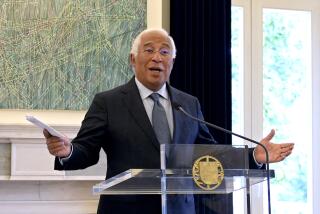French Finance Minister Quits in Scandal
- Share via
PARIS — Snarled in a major corruption scandal, powerful Finance Minister Dominique Strauss-Kahn resigned Tuesday, damaging the “Mr. Clean” image of France’s Socialist-led government and silencing a respected and reassuring voice on the international scene.
Strauss-Kahn, who hasn’t been charged with any crime, is suspected of having accepted $100,000 from a student health insurance company for fictitious services when he was an attorney. According to investigators, documents were forged later to create a paper trail justifying the payments.
Strauss-Kahn, 50, held the broadest portfolio--finance, economy and industry--in the French government. The allegations against him had mushroomed into the most damaging political crisis to beset Prime Minister Lionel Jospin since he took office in June 1997 vowing a clean break with the corruption and cronyism that had been rife under Socialist President Francois Mitterrand.
The departure of the business-friendly Strauss-Kahn will leave a yawning gap in the apparatus of the French state. He was a trusted figure for captains of industry and leftist labor leaders, foreign markets and France’s partners in the Group of 7 industrialized nations.
In the governing Socialist-Greens-Communist coalition, Strauss-Kahn was a powerful force for pragmatism. No other leading French Socialist was as enthusiastic about embracing the entrepreneurial techniques of U.S. capitalism or new technologies such as the Internet.
During his 28-month tenure, France successfully launched Europe’s new single currency, the euro, with 10 of its European Union partners. The economy grew at a rate not seen in a decade, state-owned companies such as Air France and France Telecom were opened to private capital, and unemployment decreased.
As revelations about the case being compiled against him grew, Strauss-Kahn hurriedly flew home Sunday from Vietnam, where he had been on an official visit, and huddled with Jospin. Normally suave and glib, the minister looked pale and drawn at noon Tuesday as he met with reporters to announce that he was stepping down.
“If I am resigning, and I say it with force, it is not at all because I consider myself guilty,” Strauss-Kahn declared. “I have taken this decision because I consider that morals and a sense of responsibilities impose it. It is not conceivable for me that a minister can continue to exercise his mission when judicial proceedings against him risk to do damage to the entire government.”
Strauss-Kahn flatly rejected allegations by a former official of the student fund that he had done no actual work for the money he received. According to police, however, some of the documents that justify the payment of the 603,000 francs ($100,500 at current exchange rates) are patent forgeries. Although dated 1996, they are printed on paper and use computer type fonts that weren’t in existence before 1998.
The unanswered questions over the fees paid Strauss-Kahn in 1994-96, when he was an attorney in private practice, may have brought one of France’s most meteoric political careers to an end. Admired and respected even by political opponents for his ability and charm, Strauss-Kahn was considered a likely candidate for mayor of Paris or to eventually succeed Jospin as prime minister.
His departure leaves Jospin without a trusted ally and confidant in his government, and it deprives the Cabinet of a smooth, charismatic political operator who was able to make Communists and unions accept the same sort of economic policies they fiercely combated when right-wing ministers tried to enact them.
France’s political right--on the defensive for the past two years and badly divided in its own ranks--made it immediately clear that Strauss-Kahn’s resignation won’t end the matter.
According to information dug up by investigating magistrates, a number of Socialist Party figures allegedly received money from the student fund for a decade. So far, 12 people are under investigation.
“I want to stress how arrogant this government has been in its constant affirmations for two years that it was virtuous, above reproach,” said Paris lawmaker Nicole Catala of the neo-Gaullist Rally for the Republic party. “Today, we see one of its most brilliant members tarnished by an affair that promises us plenty of twists and turns.”
President Jacques Chirac quickly accepted Strauss-Kahn’s resignation and, at Jospin’s suggestion, appointed Christian Sautter, secretary of state for the budget, to replace him.
More to Read
Sign up for Essential California
The most important California stories and recommendations in your inbox every morning.
You may occasionally receive promotional content from the Los Angeles Times.













